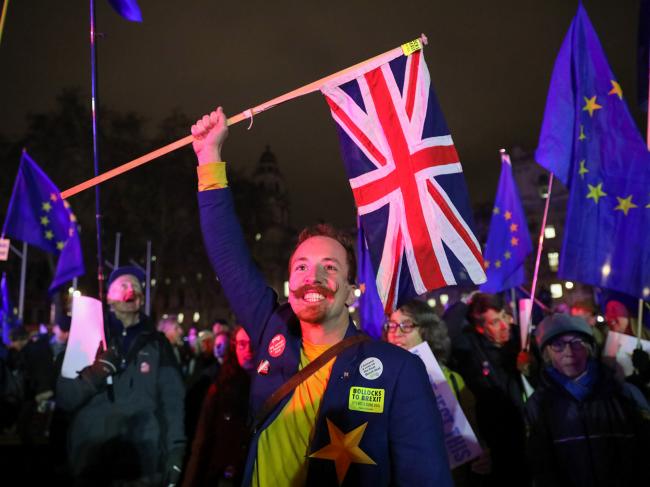(Bloomberg) -- Follow @Brexit, sign up to our Brexit Bulletin, and tell us your Brexit story.
Prime Minister Theresa May’s Brexit deal was rejected by Parliament in a humiliating defeat, her plan for leaving the European Union all but dead. Opposition leader Jeremy Corbyn responded by proposing a vote of no confidence in her government.
The House of Commons voted 432 versus 202 against the divorce the U.K. government brokered with the European Union. A margin of less than 60 would have given grounds to hope that the deal was salvageable, with the EU poised to engage in ways to make it more palatable.
#BrexitDeal in the #MeaningfulVote.The Commons voted 432 to 202 - a majority of 230.#BrexitVote pic.twitter.com/iSyyyqCJ4a
— UK House of Commons (@HouseofCommons) January 15, 2019
@jeremycorbyn has put down a motion of no confidence in the Government.It will be debated and voted on tomorrow, Wednesday 16 January 2019.If it is successful, there will be 14 days for a new government to be formed, or a general election will be scheduled. pic.twitter.com/htRZFnsidX
— UK House of Commons (@HouseofCommons) January 15, 2019
Instead, the largest defeat in over a century prompted the Labour Party to pounce to try to force a general election. The government said a vote would come on Wednesday.
“It is clear the House does not support this deal,” May told lawmakers following the vote. “But tonight’s vote tells us nothing about what it does support,” she said, pledging to talk to her Northern Irish allies and senior politicians across Parliament to try to reach a consensus. “The government will approach these meetings in a constructive spirit.”
She also acknowledged the “scale and importance” of the vote and said the first step must be to confirm that lawmakers still had confidence in her government.
It’s likely that Tories and Northern Ireland’s Democratic Unionist Party, which props up her government, would still stand by her -- for now. Though one question is whether pro-Brexit Tories who wanted to oust her as leader last year would consider voting with the opposition just to get rid of her.
More than two years after the nation cast a die and voted to leave the 28-nation bloc, the U.K. is facing political paralysis over a decision that has divided the nation and its political class for decades.
May’s choices are limited by the fact that her Conservative party does not have a majority in Parliament and that there are competing interests between those who want a clean break from the EU those that want to preserve close ties and an opposition party eager to come power.
The U.K. was meant to leave on March 29 -- two years after May triggered the process -- but now that is also looking unlikely and an increasingly boxed-in prime minister could well decide to ask fellow EU leaders for an extension as she works out her next steps.
(Updates with comment from May in fourth paragraph.)
